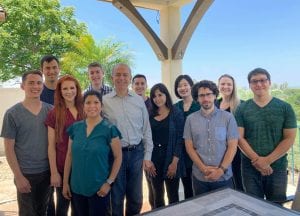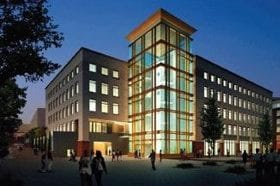Welcome to the home page of DELTAi (Driving Engineering & Life-science Translational Advances @ Irvine), directed by Professor Kyriacos Athanasiou at University of California, Irvine.
UC Irvine is located at the border between Irvine and Newport Beach in South Orange County, and has spectacular views of the Santa Ana Mountains and the beach.
 DELTAi is an interdisciplinary research group, whose objective is to understand the healing processes of cartilage, and augment those processes via sound application of tissue engineering principles. Despite the tremendous advances brought on by biology in the late 20th and early 21st centuries, cartilage regeneration remains a serious challenge. The tissues we study –articular cartilage, the knee meniscus, the temporomandibular joint (TMJ) disc, the facet joint, and nasal cartilages– exhibit little to no intrinsic ability to self-repair. In addition, they have very demanding biomechanical functions. Our engineering approaches entail the use of both biomechanical and bioactive agents/signals. By applying forces to the tissue, construct, and single cell levels, we seek to elucidate the anabolic and catabolic thresholds of chondrocyte mechanotransduction and to develop translational technologies that enhance cartilage regeneration. We are also interested in identifying suitable, alternate cell sources, such as embryonic stem cells (ESCs), dermis isolated adult stem (DIAS) cells, and mesenchymal stem cells (MSCs).
DELTAi is an interdisciplinary research group, whose objective is to understand the healing processes of cartilage, and augment those processes via sound application of tissue engineering principles. Despite the tremendous advances brought on by biology in the late 20th and early 21st centuries, cartilage regeneration remains a serious challenge. The tissues we study –articular cartilage, the knee meniscus, the temporomandibular joint (TMJ) disc, the facet joint, and nasal cartilages– exhibit little to no intrinsic ability to self-repair. In addition, they have very demanding biomechanical functions. Our engineering approaches entail the use of both biomechanical and bioactive agents/signals. By applying forces to the tissue, construct, and single cell levels, we seek to elucidate the anabolic and catabolic thresholds of chondrocyte mechanotransduction and to develop translational technologies that enhance cartilage regeneration. We are also interested in identifying suitable, alternate cell sources, such as embryonic stem cells (ESCs), dermis isolated adult stem (DIAS) cells, and mesenchymal stem cells (MSCs).
Please explore our list of publications, available here, and, visit our News page for our recent activity and important announcements. As you explore our website, we hope that you gain a better understanding of the key issues and challenges in regenerating cartilage, our main areas of research, the diverse approaches we employ, and most importantly, the people that make up the lab.
Note to Prospective Graduate Students: If you contact us to pursue graduate studies in our group at UCI, please note that first you must apply and be admitted in the BME graduate program at UCI before your application or qualifications can be evaluated by DELTAi. Unfortunately, we will not be able to respond to email inquiries from students who are not already accepted by UCI.
Note to Prospective Postdoctoral Fellows: Please contact us only in response to specific advertisements for postdoc positions. Unfortunately, we will not be able to respond to email inquiries that are not in response to specific announcements.
Note to anyone requesting a Letter of Recommendation: Please note that Prof. Athanasiou’s standard policy is to write letters for people who request them only if they have collaborated with our group on research or have been associated with us for a long time. Unfortunately, we cannot provide letters of support or recommendation for anyone else (e.g., students who only took classes/courses, faculty members that we have not worked with, etc.).
Noteworthy News
| The 2021 Athanasiou Student and Post-Doc Award Session was held prior to the 2021 BMES Annual Meeting. These awards were selected from all publications submitted to Annals of Biomedical Engineering in 2020 with a graduate student or post-doctoral scholar first author. These papers covered a variety of topics including tissue engineering, biomechanics, and medical imaging. Please see this article for more information about the awards and this year’s winners. Congratulations to the awardees! | |
| DELTAi proudly announces that the lab has been awarded an NIH R01 grant for $2 million (PI: Prof. Athanasiou). This project will develop tissue-engineered treatments for the facet joint. The work will be led by DELTAi postdoctoral fellow Dr. Rachel Nordberg, Dr. Jerry Hu, and Dr. Athanasiou, and it will be in collaboration with the Mayo Clinic. Congratulations to Rachel and the rest of DELTAi – many facet joint tissue engineering studies are in the future! You may read more in this UCI press release. |  |
| The 2019 Athanasiou ABME Student Awards session was at the October 2019 BMES Annual Meeting. Eight total awardees were selected, for a total of 14 awardees including the inaugural session in 2018, and five of these awardees attended BMES to present their papers. Please see this article from Annals of Biomedical Engineering for a summary of the awards session. |  |
Promising Publications
In June 2018, we published an article in Science Translational Medicine entitled “Tissue engineering toward temporomandibular joint disc regeneration,” in which we demonstrate successful healing of TMJ disc defects using our self-assembled tissue-engineered implants. In January 2019, we published a review article in Trends in Molecular Medicine titled “Remaining hurdles for tissue-engineering the temporomandibular joint disc” further discussing this study and outstanding limitations for translating such therapies toward the clinic. Both of these articles were recently featured in a press release and podcast on UCI’s website. In July 2019, we published a comprehensive review entitled “Surgical and tissue engineering strategies for articular cartilage and meniscus repair” in Nature Reviews Rheumatology that discusses current clinical approaches, state of the art tissue engineering research, tissue engineered products that are in the developmental pipeline, and critical future considerations for the regeneration of articular cartilage and meniscus. In July 2020, we published the review article “Collagen: quantification, biomechanics and role of minor subtypes in cartilage” in Nature Reviews Materials, which discusses the functions of all major and minor collagen subtypes in cartilage tissues, different methods for identifying and quantifying them, and how researchers can harness collagens to characterize tissues, diagnose diseases, and engineer strong tissues. In August 2022, we published an article titled “Navigating regulatory pathways for translation of biologic cartilage repair products” in Science Translational Medicine, which discussed the bottlenecks and challenges in the translation of biologic products with a focus on preclinical research for cartilage repair.
We have also recently published a research article in Nature Materials entitled “Tension stimulation drives tissue formation in scaffold-free systems,” in which we demonstrate that the self-assembling process can be enhanced by tension toward achieving neocartilage with properties on par with those of native articular cartilage. Additionally, we have published “Developing functional musculoskeletal tissues through hypoxia and lysyl oxidase-induced collagen cross-linking” in the Proceedings of the National Academy of Sciences of the United States of America (PNAS) and “Repair and tissue engineering techniques for articular cartilage,” a review article in Nature Reviews Rheumatology regarding current and widely used clinical repair techniques for resurfacing articular cartilage defects.
Our review of articular cartilage and bone healing in Science entitled “Unlike Bone, Cartilage Regeneration Remains Elusive” describes our approach to cartilage regeneration.
The second edition of our book, Articular Cartilage, is published. Please visit CRC Press.





